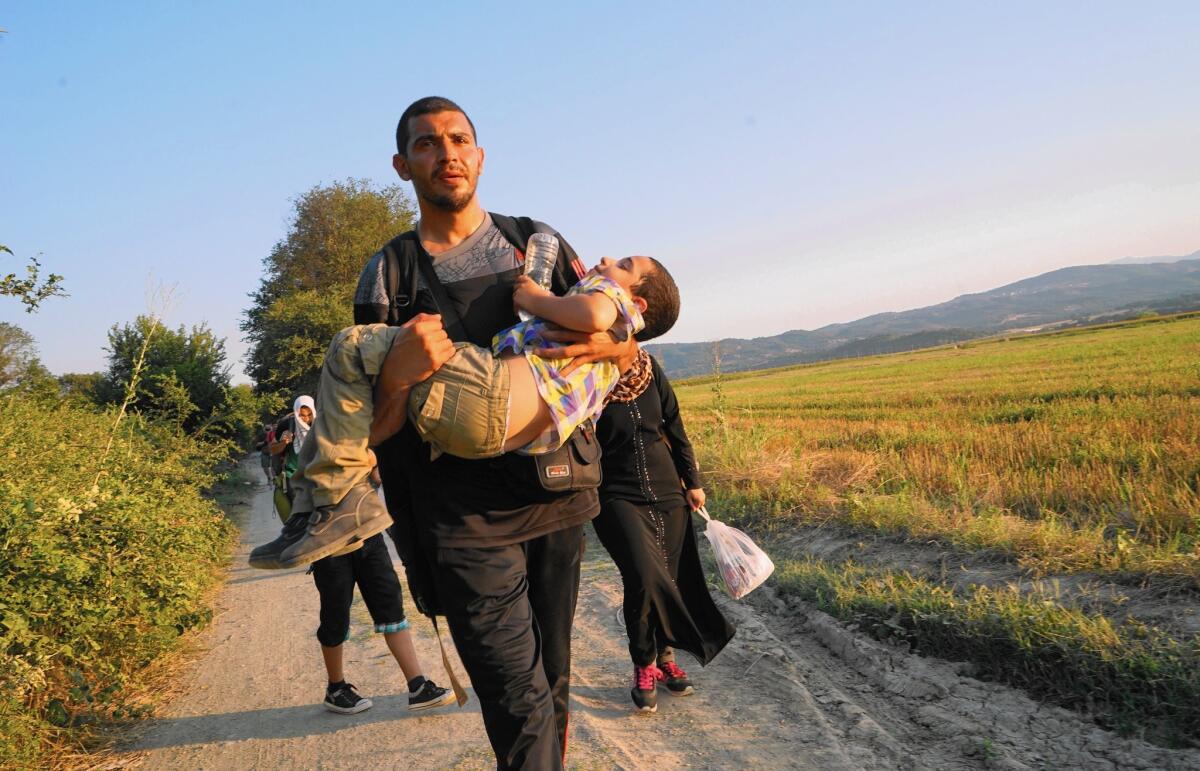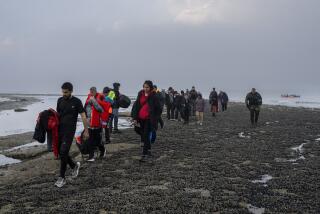At a Macedonian way station, Syrian and other migrants focus on the path ahead

Reporting from GEVGELIJA, Macedonia — The battered train station in this border town has a certain lost-in-time quality, looking a bit like the set of a World War II film. Across the street, an abandoned steam engine sits in a clump of weeds. It’s not hard to imagine a locomotive of similar pedigree pulling up on the tracks.
These days, however, the sleepy terminal is quite the bustling place: Hundreds of worn-out Syrians, Afghans and other migrants crash wherever there is shade. The station has become a major stopping point on the migrant trail as multitudes head for a new life in Europe.
A water faucet on the platform serves as a refreshment stand and washing station. Most plan to board the 5 p.m. train north to Skopje, the Macedonian capital, and head from there to the Serbian border.
Those gathered here have arrived after an overnight trek from neighboring Greece, navigating farm fields and railroad tracks. At the sweltering train station, many kick off their shoes, and men strip off their shirts, as they await the next step in their journey.
Many had been stuck in Greece for a week or more. Most rode on flimsy dinghies from Turkey to various Greek islands, then boarded ferries to the port of Athens. From there, they caught trains, buses and taxis to the northern border with Macedonia.
Looming ahead are the frontiers of Serbia and Hungary, significant and sometimes dangerous barriers before final destinations that are generally in Northern Europe. Last week more than 70 migrants were found dead in the back of a truck in Austria, apparent victims of suffocation.
“I’m planning on heading to Holland or Norway,” says Naji Ahmed, 39, from northwestern Syria’s Idlib province, sounding the names of the two countries with a certain expectation. “There’s too many Syrians now in Germany and Sweden.”
He wears a crucifix around his neck and has a cross tattooed on his forearm. Asked whether he is Christian, he laughs: He is Muslim but acquired the Christian iconography in the hope that it would help him on the journey through Europe. So far, it hasn’t made much difference.
For the last 11 years, he has been living in Dubai, United Arab Emirates, with his wife and two children, now teenagers, part of a large expatriate Syrian community in the Persian Gulf state. But Ahmed, who has been running a cellphone shop in Dubai, doesn’t see it as a place to remain permanently.
“Foreigners don’t have any rights in Dubai,” Ahmed explains, saying he hopes to gain residency in Europe and bring his family. “In Europe people have rights. We can be citizens, like anyone else.”
*
The previous evening, most had set off on foot from Evzonoi, Greece, where the ramshackle Hara Hotel is a strategic departure point. Migrants put down about $45 to rent tiny rooms — “No water, sorry,” the proprietor advises — for four-hour stretches. A signpost in the parking lot features a dancing Greek in a tasseled hat and proclaims: “Welcome to Greece.”
Syrians tend to head north in groups of about 30 — sufficient, they say, to protect themselves from thieves. Those crossing include old people, infants, the disabled. Parents hoist young kids on their shoulders.
On a recent evening, one group of Syrians filed in an orderly line through fields of wheat, sunflowers and corn, past freshly rolled hay and burly Greek farmers guiding tractors. The golden, pre-dusk light reflected on the flowers. A woman stopped to pick sunflower seeds, sharing some with her young daughter, who was lugging a sleeping bag.
Entrepreneurial Greeks have set up refreshment stands, reminiscent of L.A.-style food trucks, where owners charge a little more than $1 for a cellphone charge.
From word of mouth, the migrants have a general idea of how to proceed through unmarked paths and, at one point, across an ill-illuminated highway bridge. Cars on the bridge pose a significant danger, especially at night, when many make the crossing. A green-eyed Kurdish smuggler, in a red T-shirt and black-and-white checked scarf, offers guide services for $100 a head.
Various groups merge. A small gathering of Africans includes a man with a scarred face wearing a suit jacket and a newsboy-style peaked cap, worn rakishly to the side.
“In Nigeria,” he confides, “we have a Boko Haram problem.”
The chaotic scene is somewhat reminiscent of the San Diego-Tijuana area during the peak days of illegal immigration in the late 1980s, when thousands crossed illicitly each evening, navigating rough paths and crossing freeways on the California side.
As the Syrians make progress steadily northward, some begin to speak of their lives.
Mohammed Zardah, 26, a slim, bespectacled man with an academic mien, studied computer engineering in Damascus, he says. He hails from the suburb of Daraya, a hotbed of antigovernment rebellion. Among the many lost there, he says, was his younger brother, Rafat, a university student killed in government shelling on Aug. 25, 2012, a date that Zardah cites from memory.
“He was just walking on the street when he was hit,” says Zardah.
“I’m thinking of going to Germany,” he says as he walks forward, naming perhaps the most common destination among Syrians, along with Sweden. “I think that’s best for me. I can study there and find a job to help my family.”
Also on the trek is Mohammed Rantisi, a Syrian-born Palestinian from Damascus’ embattled Yarmouk district, a key destination for Palestinian refugees. Yarmouk, on the Syrian capital’s southern fringes, had become a battleground and sniper haven as government-supported groups and various Islamic factions fought for control. Rantisi says he has recovered from a sniper’s bullet in his thigh.
With his wife and three children, Rantisi is headed for Denmark, where his ailing mother lives with his sister. He has heard the medical care there is first rate.
An upbeat man, he frequently cracks jokes and flashes a big smile.
“Where is Angelina Jolie?” Rantisi asks half-seriously in English, referring to the actress who is a special United Nations envoy for refugee matters, as the group takes a break in thick reeds down the hill from a highway.
The forest clearing marking the border is little more than a tree-shrouded, above-ground landfill, soiled with migratory detritus. There are discarded shirts and dresses, worn-out shoes, torn-up documents, half-consumed food and jettisoned pill bottles. The garbage is strewn all along the railway tracks leading to Macedonia.
Migrants wait patiently as mosquitoes, fleas and giant flies exact their toll. By now, they are accustomed to the numbing routine: bursts of forward progress braking into hours, sometimes days, of delay. One young girl combs the blond hair of a Barbie doll pulled from her pink backpack.
Among those waiting is a woman who goes by the nickname Um Khaled — the mother of Khaled. Now 73, she was among hundreds of thousands of Palestinians who fled their homes in 1948, at the time of the creation of the state of Israel. She left her village at age 6 and has been living in Syria since.
A son and a grandson push her in a wheelchair across the fields to the Macedonian border. She looks forward to a reunion with Khaled, her eldest son, who lives in Germany.
A mobile medical team from Doctors Without Borders, the international aid group, stops by the border clearing and helps migrants with various ailments: bug bites, rashes, eye and respiratory infections — and, above all, foot blisters, which are wrapped in gauze after ointment is applied. Many of the children are traumatized, says a doctor, but there is little to be done about that here.
Near the boundary line, Greek police in military uniforms hold the migrants back, issuing handwritten numbers on torn pieces of white paper, like tickets in a deli line, staggering their illicit entry into Macedonia, some 200 yards north along the tracks.
*
Back at the train station in Gevgelija, Naji Ahmed, Mohammed Zardah and Nour Aldin, all Syrians, sit at a plastic table in a coffee shop discussing the trek, their futures and pasts. Aldin, 29, counts himself fortunate to be alive. The Damascus native says he survived a stint in Syrian state custody, at the notorious police detention center known as the Palestinian branch. He was held in a cell three levels below ground, he says.
“I heard people screaming in the nights from torture, saw the blood on the floor,” he recalls matter-of-factly. “When they let me go, the guard told me: ‘You are a lucky man to walk out of here.’”
His younger brother, Tarek, 21, a student, did not survive. He was arrested separately and died in custody, Aldin says, recalling how the family recovered his bloodied corpse.
“Will we ever go back to Syria? I don’t know,” says Aldin. “Maybe in 20 years. Maybe never. Right now we have to concentrate on getting jobs in Europe and helping our families.”
Special correspondents Nabih Bulos and Liliana Nieto del Rio contributed to this report.
More to Read
Sign up for Essential California
The most important California stories and recommendations in your inbox every morning.
You may occasionally receive promotional content from the Los Angeles Times.










